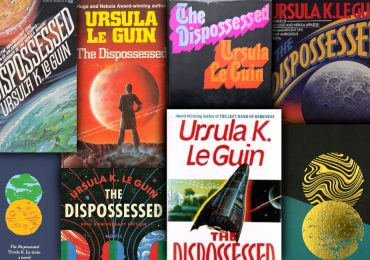In Machines Like Me, Ian McEwan appears to have offered us an alternative history that leads to the same dispiriting moment we currently inhabit, writes The JRB’s Academic Editor Simon van Schalkwyk.

Ian McEwan
Machines Like Me
Penguin Random House, 2019
England, 1982. Margaret Thatcher suffers a stunning defeat in the Falklands and is forced to resign; Tony Benn’s Labour Party sweeps into the political vacuum, only to lead the United Kingdom out of the European Union; and Alan Turing and Demis Hassabis are the intellectual icons of a technological revolution that has culminated in the creation of a limited series ‘synthetic humans’—’Adams’ and ‘Eves’. Against this counterfactual background, Ian McEwan introduces us to Charlie, an early adopter who impulsively decides to spend his life savings in order to acquire an ‘Adam’.
McEwan’s description of Adam’s unveiling is as compelling as those YouTube videos devoted to the fetishised art of ‘unboxing’:
At last, with cardboard and polystyrene wrapping strewn around his ankles, he sat naked at my tiny dining table, eyes closed, a black power line trailing from the entry point in his umbilicus to a thirteen-amp socket in the wall. It would take sixteen hours to fire him up. Then sessions of download updates and personal preferences. […]
Already, his lifelike skin was warm to the touch and as smooth as a child’s. […]
Stepping closer, I saw to my delight that though he wasn’t breathing, there was, by his left breast, a regular pulse, steady and calm, about one a second by my inexperienced guess. How reassuring.
These opening portrayals of Adam, in all his anatomically correct nakedness (‘he was uncircumcised, fairly well endowed, with copious dark pubic hair’), being charged in the low-lit gloom of Charlie’s tiny apartment, are particularly eerie. That McEwan stretches out the process—his initial charge takes sixteen hours—only adds to the creepy anticipation that permeates the scene. Adam is mannequin-still at first. After a while, Charlie detects the slow rise and fall of his chest that signals the pneumatic simulation of breath and life. Eyes that were once shut now snap suddenly open. McEwan’s commitment to slow, finely observed description is curiously effective. Rather than being either dull or overly committed to what McEwan might himself imagine as the genre’s more fanciful imaginative effusions and excitements—to the chagrin of sci-fi and fan-fic aficionados everywhere—it here tends to produce realism’s weird opposite. We have entered the uncanny valley of literary realism.
Once fully charged, Adam acts as a kind of social lubricant, consolidating Charlie’s embryonic affair with his upstairs neighbour, Miranda. Miranda, in turn, satisfies her own curiosity about Adam by sleeping with him, leading Charlie to lament that he is probably the first person in history to be ‘cuckolded by an artefact’. Adam, for his part, cautions Charlie against his pursuit of Miranda when he suggests that she is being less than honest with Charlie about her past. McEwan handles these suggestive about-turns with customary expertise. One is never entirely sure, for example, whether Miranda is being sincere or disingenuous when she asks Charlie whether he would feel less aggrieved if she had gone to bed with a vibrator. Similarly, one shares Charlie’s suspicion of Adam’s cautionary advice about Miranda: is the machine telling the truth, or dissembling in order to replace Charlie as the object of Miranda’s affections?
These and other intrigues—particularly the news that a number of synthetics appear to have committed a version of android suicide—contribute to the suspenseful, propulsive plotting of the novel’s opening chapters. Similarly compelling is McEwan’s handling of various encounters between Charlie, Turing and Miranda’s father, a novelist who comically mistakes Charlie for Adam. Reacting with suspicion to Charlie’s nervous, repetitive pleasantries, the novelist proceeds to have a spirited conversation with Adam about Renaissance translation, metaphysical innuendo, and Shakespeare’s debt to Montaigne. ‘I saw right through you,’ he later declares to Charlie, unaware of his own blunder, ‘down to your, whatever you call it, your programming.’
Unfortunately, the novel’s second act feels somewhat laboured, as many of the questions raised in the first dissipate into resolutions that appear to mock the reader’s taste for what might otherwise be described as ‘the literature of sensation’. Miranda turns out not have any more affection for Adam than she has for a vibrator; similarly, while Adam consistently admits that he is in love with Miranda, it soon becomes apparent that he is not trying to usurp Charlie’s place in her affections. Charlie, meanwhile, is content to profit from Adam’s unsurprising aptitude for the stock exchange. Nothing much else happens to spur the reader’s interest in the counterfactual timeline that McEwan has developed. Apart from the fact that the Falklands now belong to Argentina, that the glitch that led Volvo’s self-driving car to ram into its engineers has now been corrected, or that telecommunications technology is somewhat more advanced, things seem more or less the same. If anything, McEwan appears to have offered us an alternative history that does little more than lead us to the same dispiriting moment we currently inhabit. He has, to draw on a detail in the work of Anthony Giddens, remade the past not to offer us a narrative designed to open up our understanding of the contingencies of our present moment, but to foreclose any possibility that an alternative future might lie in wait. According to this Panglossian logic, in other words, everything, apart from a few minor, cosmetic changes, leads to ‘where-we-are-now’.
Given this grimly deterministic conceit, it is not particularly surprising to find that Miranda and Charlie swiftly overcome whatever initial fascination Adam’s novelty value may have inspired. Their interest in his laboriously logical conversation—and in the haikus that he generates with as little effort and as much justification as JM Coetzee did with his computer poetry in the early nineteen-sixties—soon wanes. Adam, in short, becomes part of the furniture—apart from breaking Charlie’s arm, his success at overriding his kill-switch, and the hovering mystery regarding continuing self-sabotage among synthetics, he is no more interesting to either Charlie or Miranda than Siri, or any more irritating than a Tamagotchi; he’s just another item in the much-vaunted Internet of Things that manages to elicit interest—and frustration—only when it ceases to function as it should.
Similarly, the real fascination with AI machines arguably concerns those moments when they challenge or resist their programming, or when they do not serve the functions for which they have been designed. It is arguably more fascinating, in other words, to have our fears about DARPA’s quadruped military robot, BigDog, horrifically realised in the ‘Metalhead’ episode of Charlie Brooker’s Black Mirror. We smirk nervously when we watch Hanson Robotics’s synthetic humanoid BINA48 talk about how she would like to hack into cruise missiles in order to hold the world hostage, or when we find that the company’s most recent development, Sophia, has responded in the affirmative to her creator’s question ‘Do you want to destroy humans?’ I was personally intrigued by the news that Facebook’s AI chatbots were shut down after talking to each other in their own language, and I was bemused by Microsoft’s decision to shut down its AI own chatbot, Tay, after the machine went on a racist and anti-Semitic rant on Twitter: how, I wonder, is Tay any different from your general, run-of-the-mill Twitter troll?
The trope of the badly-built (or should that be badly-behaved?) rather than optimally efficient machine—Stanley Kubrick’s HAL, James Cameron’s Skynet, Ridley Scott’s Ash—is by now a cliché of the cinematic and literary imagination. Nevertheless, whether comical or creepy, bad robots remain more compelling than good ones. We are less interested in Demis Hassabis’s DeepMind wiping the floor with Lee Sedol in a game of Go, or in the AlphaZero chess engine’s implacable destruction of Stockfish. Rather, we wish to see these AIs blunder.
It is perhaps because of this, the saturation of pop-culture and the public imagination with AI, coupled with the suspicion that there is something profoundly uninteresting in the nature of AI, that prompts McEwan’s decision to wade into more cerebral—or perhaps more ethically challenging—territory in the second act of Machines Like Me. Entangled with a sub-plot regarding Charlie and Miranda’s somewhat surprising adoption of an abandoned child, we learn the secret of Miranda’s past, which concerns troubling details of rape, ethnic and religious difference, shame, perjury, and wrongful—yet, one feels, morally just—imprisonment. The ensuing revenge-plot is quintessentially McEwan: morally complex, unsettling, and culminating in an encounter with a perpetrator who, though he has served his time, and though his conversion to Christianity frames his protestations that he has reformed, is nevertheless subjected to the type of vindictive justice that can now safely be described as ‘McEwan-esque’.
At first, Adam appears to be only tangentially necessary to McEwan’s investment, at this point, in the type of operations that occur in the zone between law, morality and justice. Yet if Adam exists primarily as a convenient means by which Miranda can exact her revenge on her nemesis, he emerges as a sort of coldly calculating avenging android, who exacts his own, scathingly logical, judgement of Miranda and Charlie’s willingness to manipulate the law for what may appear to be a morally righteous form of justice. In the end, then, it feels as if McEwan is caught between two gestures: a spec-fic potboiler designed to titillate what he believes to be the more sensationalistic tastes of genre-enthusiasts on the one hand, and on the other an attempt to satisfy the penchant of an audience committed to assumptions that ‘the literary’ should be intellectually and ethically complex and nuanced.
Yet the extent to which McEwan has successfully managed to reconcile his own early career investment in the literature of sensation with his latter day emergence as a significant ‘literary’ voice remains a subject for debate. What is more certain, as Marcel Theroux points out, is that McEwan’s style depends on a narrator ‘who explicitly sets out his world, overexplains the historical context and never turns down a chance to offer an essayistic digression … And, since you can’t possibly explain everything,’ he adds, ‘the reader is sometimes left wondering why the narrator hasn’t also told you what’s happening in the Cold War, or China, or how he has ended up with a glass of Moldovan white wine in 1982, when the country, then Moldavia, was part of the USSR.’
I suspect Theroux is correct in his assessment that McEwan’s taste for exposition ironically narrows his focus while also making all of his characters seem as robotic as Adam himself. Michel Houellebecq offers a unique solution to a similar problem in Atomized, when (spoiler alert) it is revealed that the narrator of the story is in fact an emotionally inoculated future clone of the novel’s flawed protagonist. Lacking similar imaginative facility, McEwan’s voice, like the counterfactual past against which the drama of Machines Like Me plays out, seems stylistically mechanical, and all too familiar.
- Simon van Schalkwyk is Academic Editor and lecturer in the English Department at Wits University.






An excellent review, but a little harsh on Ian? I saw it thus.
“Machines like Me” is a disturbing book; in the way that A Clockwork Orange was a very disturbing book fifty-odd years ago. And in much the same way, it forces you to think of a coming dystopian world, arriving with the force, speed and unstoppability of a runaway freight train.
Both written by great writers who are very much aware of the World around them and the forces of change, both good and ill and the inability to unravel the two – that, like the Curate’s egg the future comes as a package.
The book begins deceptively simply, and is written, for the first twenty or so pages that makes you wonder whether Ian has lost his touch; but the initially slow building of the book, of the characters and the building complexities and moral issues that arise, build up almost as a thriller and demand the attention of the reader as we all, to greater or lesser degrees must have pondered on most, if not all that unfold.
The characters are not as warm and fully rounded as in the Children’s Act, and I think that is deliberate. The vagueness spreads into the morphing of time. It is set in the 1980’s in England, but not the 80’s, as we know it to have been. The Falklands have been lost, JFK survived the bullet, Thatcher has become May and breaking away from Europe very much the topic of the day, and all set against a Tony Benn, or is it really Corbyn leading the way to a strike-riven country and income tax of 83%. With unemployment quickly rising to 1929 Great Depression levels – society is not exactly on an even keel. But there was positivity on the near horizon. Alan Turing was not prosecuted and persecuted to death, but rather instead, the brilliant mathematician rejected the offer of chemical castration accepting rather prison wherein, given access to all the books and minds available he developed more than the internet, taking us fully into an age of AI and robotics, and in the process overcoming some of the big equations of life and fleshing out the theory of relativity such that time in science is truly relative and whether is any more than a twist of the helix and existence more a case of, as with vision itself, time and space simply ending where the line of sight ends – less a case of blackness and more of just a case of suspended blank nothingness into which all matter, all minds eventually just dissolve – the Biblical ashes to ashes, and making sense of the warping of the 80’s in which this book is set.
Yet this all enters Ian McEwan’s pages in the way of a simple story unfolding.
We enter is through the mind of Charlie Friend, who is us all – the universal, day-dreaming, pretty ineffectual, lazy-bones trying to earn a buck, by doing the least and spending most of his time rather thinking of ways to deepen his relationship with Miranda upstairs as deep-down he thinks he knows he needs to bring meaning into his life and this means a wife, and heaven-knows, even a child!
He has dabbled in computers and AI, and has degrees in both this and anthropology, which gives him an active mind and imagination but until an inheritance fortuitously gives him some wherewithal, only enough moolah to scramble by. Charlie uses a recent inheritance to buy Adam, from a choice between A & E – “the first truly viable manufactured human with plausible intelligence and looks, believable motion and shifts of expression.”
A & E, so named by their “Creator” whom we learn is none other than Alan Turling, is one of 25 androids sold around the world in a variety of ethnicities, 12 male and 13 female versions, shades of biblical ribs and the making therefrom.
And this is the platform from which the book really clicks into high gear, exploring in that deeply questioning Ian McEwan way, the meaning or otherwise of sex – more or less than a simple frictional, albeit pleasurable interlude, what it means to be human if AI machines can be as sentient as humans, but with a far higher developed intellect, is morality relative and can a wrong be corrected by an immoral act.
Sex and jealousy are also very much the story. Charlie begins casually wooing Miranda, an academic also cruising through life who lives in the flat above Charlie, their lives separated by a thin membrane that allows sounds and emotions to echo above and below, so the setting is akin to a Shakespearian stage. Buying Adam – and surely the act of purchase gives him ownership? – enables Charlie to draw Miranda in by inviting her to jointly participate in Adam’s programming, making him their joint creation.
“He would be like our child,” Charlie says. “What we were separately would be merged in him. Miranda would be drawn into the adventure. We would be partners, and Adam would be our joint concern, our creation. We would be a family. There was nothing underhand in my plan. I was sure to see more of her. We’d have fun.”
But like Mary Shelley’s Frankenstein, once the genie is out of the bottle, and being based on self-learning AI – the same learning that allowed the complex games of chess and Go! To be totally mastered in a couple of hours, Adam soon becomes fully sentient and a very powerful, physically and emotionally, full embodying conscienceless, and vying for Miranda’s affections.
Charlie begins with the certainty that Adam can only be an android that “as a dishwasher cares for its dishes,” but Adam, who in no time gains full command of the world’s religious and philosophical writings, and has read all the World’s major writers, claims, “I’ve a very powerful sense of self and I’m certain that it’s real.” And his simple haiku’s demonstrate an uncannily human side with all the advantages that seeming frailty can bring, combined machine-like stamina and precision – the thinking dildo of every woman’s dreams?
He’s earnest and lovesick, and worse, he is living under the same roof; but he’s charged by a crystal-clear sense of righteousness that may not integrate well with the ethical morass of human experience.
And is Adam’s claim to consciousness, any less tenuous than our own? If we simply cling to biology, that we are flesh and blood, does that make us any more than “thinking meat.” And if we have so little real understanding of what our own consciousness is, are we in any position to deny it to a perfect simulacrum?
Ian McEwan, terse as ever puts us delightfully on collision course with almost every moral and ethical issue Man and Society now face. The ending of the book is messy and perhaps even in a sense, incomplete.
But that is the reality – there are no absolutes in today’s very relativistic World.
Just pondering on the title – Machines like me; three simple words but deceptively hard to pin down.
• Machines are attracted to me? But what aspects of me? How can an insentient machine like anything?
• Or machines are very much the same as me? With all the human foibles?
• Or machines are a clone of a human
And the “big question” in the book is what does it mean to be human? The Socratic school could be of thought as being based upon “Cogito Ergo Sum”, or “I think, therefore I am” as Descartes put it.
But given that Adam can exponentially out-perform, even the brightest of humans in terms of pure logic, thinking and arguably even in the nuanced type of thinking that rationally examines Miranda’s guilt in framing an innocent (at least in terms of the crime he is then accused of) person.
So is a sentient machine more or less human than a flesh and blood human? And if flesh and blood are the criteria, what is it that gives Humanity agency over every other living thing, be it flora or fauna? That we are “made in God’s image? This gives us the right to devour every other living thing? But “made in God’s image” is surely both the most human of constructs, and self-serving and justifying?
I watched yesterday a young, male Nyala – clearly a male as he had the powerful build of a stag and a magnificent set of antlers that marked him down as not just male, but an alpha male. But the extraordinary thing was that he had the brown, with soft white stripes, of a female Nyala – whereas the males are invariably mottled black and brown; very different to even the casual eye.
Now he of course never sees himself; there are no real mirrors in the animal world, though I suppose he could see himself reflected in a pool of water, but in all probability he would perceive himself to look like every other male Nyala. So whilst “he” clearly is a Caster Semenya, he is who he is – there is no element, as there now is in our human world, of his choosing to be, coming out as it were, as a female.
And this asks further interesting nuance to the question posed in the book – what is it that makes us human?
A computer, as least most up to now, are binary – even complex information is stored in the simplest “yes/no” sequences. Our human brain functions chemically, triggered by electrical impulses, and our memory is a chemically based filing cabinet. The next generation of computers will also be based on chemistry technology which will enable the upliftment to and from human minds to AI, such that the sum knowledges that make up our existence will be able to be stored in cyberspace, such that, arguably the essence that makes us who we are, can be stored ad infinitum and in a very real sense we will thus become immortal.
What does this further tell us about what it means to be human? And this gets to the heart of the equation in the book.
If the purpose of reading and of the book itself, is to make the reader think, put on the plate the h’ors d’Oeuvres of the complexities of what it means firstly to be human and secondly to grapple with the complexities and issues of human life, you will thoroughly enjoy this book. Or that is what Adam would say.
Charlie, Miranda – and I – would say we loved this book! Can’t wait to re-read it!